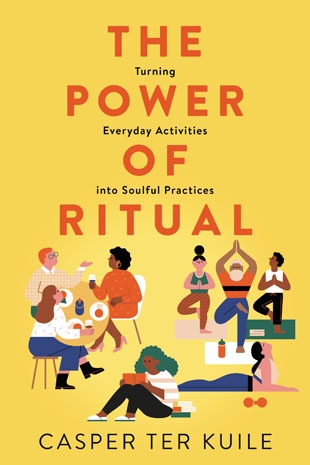Casper ter Kuile holds a Masters of Divinity and Public Policy degrees from Harvard University and is a Ministry Innovation Fellow at Harvard Divinity School. He cohosts the award-winning podcast Harry Potter and the Sacred Text. After publishing several groundbreaking maps of the changing spiritual landscape, focusing often on how those not religiously affiliated are creating community, he cofounded the Sacred Design Lab, a research and design consultancy working to create a culture of belonging and becoming.
The religious and spiritual scene in the United States is changing dramatically. Mark Chaves, a sociologist at Duke University, has estimated that over 3,500 churches close their doors every year. Equally startling is the fact that the percentage of Americans who describe themselves as atheist, agnostic, or "nothing in particular" has grown to 26%; 2019 General Social Survey data suggests that "nones" are now as numerous as evangelicals and Catholics in the United States.
Although these changes seem radical and drastic, ter Kuile points out that even though attendance at congregations is down, the hunger for community and meaning remains. We've long agreed that the spiritual life encompasses more of people's experiences than has been considered "sacred" (versus "secular") in the past. In our book Spiritual Literacy, we quote John Shea, a contemporary Catholic theologian: "Spirit suffuses everything; and so the spiritual life is simply life wherever and whatever, seen from the vantage point of spirit."
We also agree with the author's affirmation of unbundling and remixing spiritual traditions; this process adds depth and richness to an individual's path. With energy and vision, ter Kuile describes four major connections and suggests some rituals to go with them.
Connecting with Self. Here the author delves into the Harry Potter books as sacred texts, sharing the origins of his popular podcast. He sees such offerings from the popular culture as "a path to greater awareness." He has adapted the popular spiritual practice of lectio divina into four questions that can be used with such stories:
— What's literally happening in the narrative? Where are we in the story?
— What allegorical images, stories, songs, or metaphors show up for you?
— What experiences have you had in your own life that come to mind?
— What action are you being called to make?
Again, we agree with this emphasis, and at Spirituality & Practice, we have reviewed more than 7,500 books and 6,000 books that you can practice with!
In this section, ter Kuile also praises the observance of the Sabbath as a ritual that enables us to connect with our deeper selves. He describes his own experiences with a tech sabbath, a sabbath for solo time, and a sabbath for play and creativity.
Connecting with Others. Many of our everyday activities put us in the company of others, and this chapter covers the rituals possible during shared meals. ter Kuile also covers building relationships through fitness communities, breaking through the vulnerability barrier, building solidarity through suffering and laughter, decentering yourself, community as wonderful and terrible, and the courage needed to deepen our connections.
Connecting with Nature. The subheads in this chapter reveal a broad range of practices: pilgrimage, creating new traditions, celebrating the seasons, and reimagining a liturgical calendar. No matter where you live, including the city, you can use rituals to become more at home in the world.
Connecting with Transcendence. The first association people often make with "ritual" is ways to reach out to the Divine. ter Kuile explores and sometimes reframes traditional prayer practices of adoration, contrition, thanksgiving, and supplication.
The Power of Ritual by Casper ter Kuile hits the mark with its call for soulful practices and fresh ritual to give lives meaning and catalyze spiritual transformation. He concludes with two points:
"First, you already have a host of rituals we might call spiritual practices — even if you'd never use that language. Reading, walking, eating, resting, reflecting; these are legitimate and worthy of your attention and care, and they can be the foundation of a life of deep connection. Second, I hope you feel empowered to translate ancient traditions to enrich those modern practices and that you feel permission to be creative in combining the ancient and the emergent." Although ter Kuile specifically addresses those who have left or never attended a religious congregation, his suggestions should be welcomed by all those seeking to freshen their spiritual lives.
